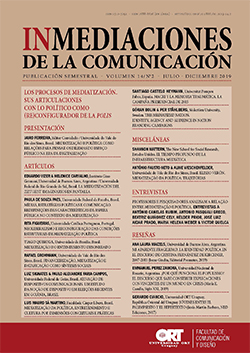La nación mediatizada. Identidad, agencia y audiencia en las campañas de nation branding
DOI:
https://doi.org/10.18861/ic.2019.14.2.2926Palabras clave:
Nation branding, mediatización, identidad, audiencia, agenciaResumen
Nation branding es una práctica dinámica que se desenvuelve de manera rápida, es un subproceso de un proceso de mediatización más amplio, utilizada para promover o reajustar imágenes de un Estado-Nación para turistas o inversores. Especialmente, los Estadios-Naciones jóvenes, sienten la necesidad de crear nuevas imágenes de sí mismos a los ojos del mundo, pero, como esos Estados-Nación también tienen una historia de soberanía aún breve, precisan simultáneamente, construir una solidaridadsocial y una comunidad interna a fin de formar una base necesaria para la construcción de una Nación. Este artículo parte de esa tensión y abordar tres temas: agencia, audiencia e identidad, que consideramos es necesario de una mayor teorización debido a que la práctica está intentando aún encontrar su forma. Estos temas son discutidos en relación a los esfuerzos de creación de marca del nuevo Estado de Ucrania, en Europa oriental, en la última década. Se concluye que hoy las campañas de Nation branding, son orquestadas también por agencias de relaciones públicas internas (a lo contrario del dominio anterior de las agencias británicas) que tienen en consideración el público interno de otras maneras, diferentes de las campañas de branding anterior, y que traen cuestiones de construcción de identidad mucho más complejas de las que fueron utilizadas anteriormente. El caso ucraniano ilustra, así, la mediatización de símbolos nacionales en la sociedad contemporánea.
Descargas
Citas
Adams, S. & Greutzner Robins, A. (eds) (2000). Gendering landscape art. Manchester: Manchester University Press.
Anderson, B. (1991). Imagined communities: reflections on the origin and spread of nationalism. London: Verso.
Anholt, S. (2007). Competitive identity: the new brand management for nations, cities, and regions. New York: Palgrave Macmillan.
Aronczyk, M. (2007). New and improved nations: branding national identity. In Calhoun, C. & Sennett, R. (eds). Practising cultures (pp. 105-128). London: Routledge.
Aronczyk, M. (2008). ‘Living the brand’: nationality, globality and the identity strategies of branding consultants. International Journal of Communication, 2, 41-65.
Aronczyk, M. (2013). Branding the nation. the global business of national identity. Oxford: Oxford University Press.
Bezpiatchuk, Z. (December, 2011). Branding Ukraine: lip-synching a happy tune. The Ukrainian Week, 20. Avaiable on: http://ukrainianweek.com/Society/38090.
Bohlman, P.V. (2004). The Music of European Nationalism. Cultural Identity and Modern History. Santa Barbara: ABC Clio.
Bolin, G. (2002). Nationsmarknadsföring. Eurovisionsschlagerfestivalen som modern världsutställning. In Ericson, S. (ed.). Hello Europe! Tallinn Calling! Eurovision Song Contest 2002 som mediehändelse (pp. 33-42). Huddinge: MKV.
Bolin, G. (2006a). Visions of Europe. Cultural Technologies of Nation States. International Journal of Cultural Studies, 9(2), 189-206.
Bolin, G. (2006b). Electronic Geographies. Media Landscapes as Technological and Symbolic Environments. In Falkheimer, J. & Jansson, A. (eds). Geographies
of Communication. The Spatial Turn in Media Studies (pp. 67-86). Göteborg:
Nordicom.
Bolin, G. & Hepp, A. (2017). The complexity of mediatization: charting the road ahead. In Driessens, O., Bolin, G., Hepp, A. & Hjarvard, S. (eds), Dynamics of mediatization: institutional change and everyday transformations in a digital age (pp. 315-332). London: Palgrave.
Bolin, G. & Ståhlberg, P. (2010). Between community and commodity. nationalism and nation branding. In Roosvall, A. & Salovaara Moring, I. (eds). Communicating the Nation. National Topographies of Global Media Landscapes (pp. 79-101). Göteborg: Nordicom.
Bolin, G. & Ståhlberg, P. (2015). Mediating the Nation State: The Role of “The Media” in Nation Branding Campaigns. International Journal of Communication, 9, 3065–3083.
Bourdieu, P. (1983/1993). The Field of Cultural Production, or: The Economic World Reversed. In: Bourdieu, P. (1993). The field of cultural production. essays on art and literature (pp. 29-73). Cambridge: Polity.
Calhoun, C. (2007). Nationalism and cultures of democracy. Public Culture, 19(1), 151-173.
Davies, A. (2013). Promotional cultures. Polity: Cambridge.
Geertz, C. (1973). The interpretation of cultures. New York: Basic Books.
Graan, A. (2013). Counterfeiting the Nation? Skopje 2014 and the Politics of Nation Branding in Macedonia. Cultural Anthropology, 28(1), 161-179.
Hepp, A. (2013). Cultures of mediatization. Cambridge: Polity Press.
Hepp, A. & Krotz, F. (eds.) (2014). Mediatized iFirst, worlds: culture and society in a media age. Houndmills: Palgrave MacMillan
Hjarvard, S. (2013). The mediatization of culture and society. London: Routledge.
Hobsbawm, E. & Ranger, T. (eds) (1983). The invention of tradition. Cambridge: Cambridge University Press.
Jansen, S. C. (2008). Designer Nations: neo-liberal nation branding – brand Estonia. Social Identities, 14(1), 121-142.
Jordan, P. (2011). The Eurovision Song Contest: Nation Branding and Nation Building in Estonia and Ukraine. PhD thesis, University of Glasgow, Glasgow, Scotland.
Jordan, P. (2013). Nation Branding: a tool for nationalism? Journal of Baltic Studies, 1-13.
Kaneva, N. (2011). Nation Branding: toward an agenda for critical research. International Journal of Communication, 5, 117-141.
Kaneva, N. (ed.) (2012). Branding post-communist nations. marketizing national identities in the ‘New’ Europe. New York & London: Routledge.
Kaneva, N. & Popescu, D. (2011). National identity lite: nation branding in post-communist Bulgaria and Romania. International Journal of Cultural Studies, 14(2), 191–207.
Lundby, K. (ed.) (2014). Mediatization of communication. Berlin: de Gruyter.
Lury, C. (2004). Brands. The logos of the global economy. London & New York: Routledge. Myroshnychenko, V. (Jun., 2006).
‘Брендстраныкакдвигательэкономического
развития’ (The country brand as a driver of economic growth). Комп&ньоН
(Companion), 24(488), 16–22.
Olins, W. (2003). On brands. London: Thames & Hudson.
Ståhlberg, P. & Bolin, G. (2016). Having a soul or chosing a face? Nation branding and the concept of “identity”. Social Identities, 22(3), 274-290.
Valaskivi, K. (2013). A Brand new future? Cool Japan and the social imagenary of the branded nation. Japan Forum, 25(4), 485-504.
Varga, S. (2013). The politics of nation branding: collective identity and public sphere in the neoliberal state. Philosophy and Social Criticism, OnlineFirst, DOI:10.1177/0191453713494969.
Volcic, Z. & Andrejevic, M. (2011). Nation branding in the era of commercial nationalism. International Journal of Communication, 5, 598-618.
Wolczuk, K. (2000). History, Europe and the ‘national idea’: the ‘official’ narrative of national identity in Ukraine. Nationalities Papers, 28(4), 671-694.





